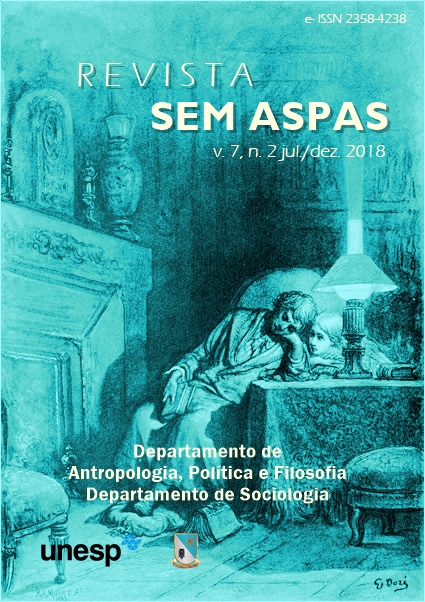The rap and its ways of consumption: an analysis of social and mental implications in the individual
DOI:
https://doi.org/10.29373/sas.v7i2.12495Keywords:
Rap music, Symbolic borders, Consumption, Contemporary culture, Emotionality.Abstract
In the late 1990s and early 2000s, rap reached its boom with the motive force being the denunciation of the reality of the peripheries and the black individual in Brazil. Today, the market goes on to sell musical style and dress beyond the favelas where the lyrics take on new significations and approach incessantly a form of luxury worship, entering the musical taste of the upper middle class. In view of this, I propose to analyze the process of identity construction and "wish to be" observed in the black and peripheral, a desire that is blocked by the fact that many singers do not denounce the contradictions experienced anymore and, unconsciously, can be a generator of impacts on the emotionality and sociability of the individual due to the feeling of frustration and insufficiency caused by the conditions of the environment that prevent him from transforming himself and the space that surrounds him.
Downloads
References
BOTELHO, A; SCHWARCZ, L. Um enigma chamado Brasil: 29 intérpretes e um país. Ed.: Editora Companhia das Letras. São Paulo, 2009.
BOURDIEU, P. A distinção: Crítica social do Julgamento. Ed.: EDUSP. São Paulo, 2007.
COSTA CIAMPA, A. A Estória do Severino e a História da Severina. Ed.: Brasiliense, 1993.
DOUGLAS, M; ISHERWOOD, B. O mundo dos bens: uma antropologia do consumo. Ed.: UFRJ. Rio de Janeiro, 2004.
EHRENBERG, A. O culto da performance: da aventura empreendedora à depressão nervosa. SP: Ideias & Letras, 2010.
ELIAS, N. Ensaio teórico sobre as relações estabelecidos-outsiders. Ed.: Zahar. Rio de Janeiro, 2000.
FANON, F. Pele negra, máscaras brancas. Ed.: EDUFBA. Salvador, 2008.
FERNANDES, F. A Integração do Negro na Sociedade de Classes. Ed.: Editora Ática. São Paulo, 1978.
FREYRE, G. Casa-grande & senzala. Ed.: Global. São Paulo, 2006.
MEIRELLES, R; ATHAYDE, C. Um país chamado favela. Ed.: Gente. São Paulo, 2014.
OLIVEIRA, E. Rap contestação e funk ostentação: Consumo e discursos sonoros na periferia. Tese. Araraquara, 2016.
ORTIGUES, M.C.; ORTIGUES, E. Édipo Africano. Ed.: Escuta. São Paulo, 1989.
SANTOS, N. Tornar-se Negro. Edições Graal LTDA: Rio de Janeiro, 1983.
SAHLINS, M. Ilhas de História. Ed.: Zahar. Rio de Janeiro, 1990.
DISCOGRAFIA
BK. Quadros. Álbum: Castelos e Ruínas. Gravado em: Pirâmide Perdida Records. Rio de Janeiro, 2016.
BK. Titãs. Álbum: Gigantes. Gravado em: Pirâmide Perdida Records. Rio de Janeiro,2018.
BK; Akira Presidente; Drik Barbosa. Correria. Álbum: Gigantes. Gravado em: Pirâmide Perdida Records. Rio de Janeiro, 2018.
BUKOLA 2TEY, SANT; TIAGO MAC. Pandora. Single. Rio de Janeiro,2018.
CLARA LIMA; CHOICE; TIAGO MAC; KAYUÁ. Inimigos. Single. Gravado em: Brainstorm Studio. Rio de Janeiro, 2018.
MÃOLEE; BK; FILIPE RET. DINHEIRO. Gravado em: TudoBom Records. Rio de Janeiro, 2018.
SANT. Sodoma. Single. Gravado em: Selo Favela Cria. Rio de Janeiro,2018.










